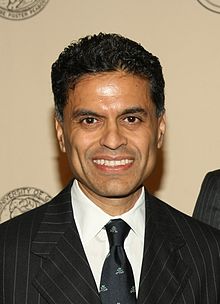The Post Prints Fareed Zakaria’s Fake News on Iran

A May 25, 2017 Washington Post Op-Ed by CNN host Fareed Zakaria misled readers about the extent of the Islamic Republic of Iran’s connection to terrorist groups.
Zakaria’s commentary (“How Saudi Arabia Played Donald Trump”) focused on Saudi Arabia’s connection to Islamist terror groups. The host of CNN’s self-described “flagship foreign affairs show,” entitled GPS, correctly pointed out that “for five decades, Saudi Arabia has spread its narrow, puritanical and intolerant version of Islam—originally practiced almost nowhere else—across the Muslim world.” That ideology, Wahhabism, has influenced Islamist terror groups, including the Islamic State of Iraq and Syria (ISIS) and al-Qaeda.
Zakaria provided Post readers with details about how the Kingdom has exported Wahhabism via Saudi-funded mosques, clerics and programs. But when discussing Iran’s support of terrorism the CNN host stumbled, claiming that it “would be wildly inaccurate to describe” Tehran as the “source of jihadist terror.”
Doubling down, Zakaria asserted:
“More than 94 percent of deaths caused by Islamic terrorism since 2001 were perpetrated by the Islamic State, al-Qaeda and other Sunni jihadists. Iran is fighting those groups, not fueling them. Almost every terrorist attack in the West has had some connection to Saudi Arabia. Virtually none has been linked to Iran.”
However, this both minimizes and misleads on Iran’s role in supporting terrorism. As CNN itself has noted, in 2016 the U.S. State Department declared Iran to be the “top state sponsor of terror (“State Department report finds Iran is top state sponsor of terror,” June 2, 2016).” Tehran received this dubious distinction in numerous previous years as well.
Zakaria would have readers believe that Iran is merely a “destabilizing force in the Middle East” that “supports some very bad actors.”
Massive international terrorist organizations, such as Hezbollah—which, from its Lebanese safe haven controls about as much territory as ISIS—receive extensive Iranian support. Hezbollah has conducted terrorist attacks in the Western hemisphere, including the 1992 and 1994 bombings of Jewish day care and community centers in Argentina. In 2011, an Iranian plot to blow up a Washington D.C. restaurant—an attempt to murder a Saudi official—was foiled. That plot emanated from the Islamic Revolutionary Guard Corps (IRGC), a massive entity that trains U.S.-designated terrorists groups, such as Hamas, Palestinian Islamic Jihad, and others as Yaacov Katz and Yoaz Hendel noted in their 2012 book Israel Vs. Iran: The Shadow War.
Indeed, Iran funds numerous Sunni terrorist groups that have murdered Americans. In addition to Palestinian terror groups like Hamas and PIJ, Iran also has ties to al-Qaeda. The bipartisan 9/11 commission report, which investigated the Sept. 11, 2001 al Qaeda terror attacks — the largest mass casualty terrorist attack in U.S. history — pointed out that there was “strong evidence that Iran facilitated the transit of al Qaeda members into and out of Afghanistan before 9/11, and that some of these were future 9/11 hijackers.” After the U.S. invasion of Afghanistan in 2001, many al Qaeda terrorists fled to neighboring Iran — where they received sanctuary under the guise of “home detention.” The Islamic Republic refused to extradite them to their home countries for prosecution. And, as CAMERA noted in a September 8, 2016 Washington Times Op-Ed, the U.S. has sanctioned numerous top al-Qaeda officials who were residing in Iran—including a son of Osama bin Laden, the terror group’s founder.
Many in the media have frequently failed to note the Islamic Republic’s ties to terror groups, including al-Qaeda and its descendant and future rival, ISIS. Zakaria, with his academic credentials, regular Washington Post columns, and CNN show, has contributed to this misunderstanding.
More from SNAPSHOTS
Why Does a NY Times Journalist Want to Suppress an Anti-Hamas Article?
May 29, 2018
A New York Times journalist thinks the Wall Street Journal shouldn't have published an opinion piece criticizing Hamas's anti-Israel propaganda campaign. The reporter, Declan Walsh, is one of the Times reporters who has covered the [...]
Iran is Funding Hamas’s Violent ‘Protests’ at the Border, Media M.I.A.
May 22, 2018
Iran's Supreme Leader, Ayatollah Ali Khameini The Islamic Republic of Iran is behind the recent Hamas-orchestrated violent demonstrations—dubbed the “March of Return”—at the Israel-Gaza border, according to Israeli authorities. Yet many major U.S. news outlets [...]
Are Gaza Gunmen “Protesters”? NY Times Refuses to Say
May 21, 2018
After repeatedly insisting that "Israeli soldiers killed 60 protesters" during clashes last Monday, May 14, the New York Times is refusing to clarify whether its count of supposed protesters includes the eight armed Hamas fighters [...]
Bahrain Says Israel Has a Right to Self-Defense, and the Media Shrugs
May 15, 2018
Bahrain's Foreign Minister and then-U.S. Secretary of State John Kerry The foreign minister of the Arab nation of Bahrain, Sheikh Khalid al-Khaalifa declared on May 10, 2018 that Israel has a right to defend itself. [...]
AFP Captions Call Jerusalem Parade Participants Settlers
May 15, 2018
Numerous Agence France-Presse photo captions generalized all participants in Sunday's Jerusalem Flag Parade as "settlers," despite the fact that the crowd hailed from across Israel, within the Green Line, as well as outside. A sampling [...]
Journalist: Hezbollah Shows ‘More Maturity’ Than Israel
May 9, 2018
Hezbollah Secretary General Hassan Nasrallah A Los Angeles Times special correspondent, Nabih Bulos, declared on Twitter on May 7, 2018, that Hezbollah (“Party of God”) shows “more maturity” than Israel. Hezbollah is a Lebanese-based, Iranian-backed, [...]


